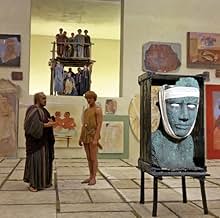A series of disjointed mythical tales set in first-century Rome.A series of disjointed mythical tales set in first-century Rome.A series of disjointed mythical tales set in first-century Rome.
- Nominated for 1 Oscar
- 5 wins & 8 nominations total
Mario Romagnoli
- Trimalcione
- (as Il Moro)
Danika La Loggia
- Scintilla
- (as Danica la Loggia)
Lucia Bosè
- La matrona
- (as Lucia Bosé)
Joseph Wheeler
- Il suicida
- (as Joseph Weelher)
George Eastman
- Minotauro
- (as Luigi Montefiori)
Storyline
Did you know
- TriviaGian Luigi Polidoro registered the title Satyricon (1969) for his movie first. Federico Fellini fought to use the title for his movie but lost the case. Subsequently the title was changed to Fellini Satyricon.
- GoofsIn one version, Joseph Wheeler is credited as 'Joseph Weelher'.
- Quotes
Trifena: Lichas, take your groom's hand. Remember you must be faithful to him forever. And you, groom, know that you must forget your past taste for young boys. A husband takes no liberties. You must dedicate your entire self to your bride forever. May complete harmony and great happiness be yours. Venus favors marriages held at sea.
- ConnectionsEdited into Fellini: I'm a Born Liar (2002)
- SoundtracksThe Drums for the Niegpadouda Dance
From Anthology of Music of Black Africa
Recorded by Everest Records
Arranged by Bernard C. Salomon
Published by Arvon Music
Featured review
Fellini engages us through a tapestry of decadence during the Roman Empire with such stunning juxtapositions of exceptional images from a collapsing society that one cannot help but be reminded of our own times and its disconcert morality
The film is freely adapted from Petronius' book, which is the exploits of two young Romans, Ascilto and Encolpio, as they venture throughout the empire, indulging in both heterosexual and homosexual relationships In the course of this proliferation of sensuality, Ascilto becomes impotent and madly goes for a cure which ends in tragedy for Encolpio
The movie's treatment of the sexual decadence is remarkably powerful without being explicit In fact, in light of the mental images it presents, it actually puts on view very little on screen But there is a great quantity of mysterious whores, hedonists, gluttons, and gross indulgence in carnal pleasure In the midst of this chaos, however, there is a beautifully light reprieve as the young Romans come across a forsaken villa... A very charming slave girl has remained behind, and she playfully troubles the two men into an erotic game
Apart from that, the sex is portrayed as bizarre, tempting, suggestive of hidden secrets, violating the rules of morality, and going beyond the limit
The film is freely adapted from Petronius' book, which is the exploits of two young Romans, Ascilto and Encolpio, as they venture throughout the empire, indulging in both heterosexual and homosexual relationships In the course of this proliferation of sensuality, Ascilto becomes impotent and madly goes for a cure which ends in tragedy for Encolpio
The movie's treatment of the sexual decadence is remarkably powerful without being explicit In fact, in light of the mental images it presents, it actually puts on view very little on screen But there is a great quantity of mysterious whores, hedonists, gluttons, and gross indulgence in carnal pleasure In the midst of this chaos, however, there is a beautifully light reprieve as the young Romans come across a forsaken villa... A very charming slave girl has remained behind, and she playfully troubles the two men into an erotic game
Apart from that, the sex is portrayed as bizarre, tempting, suggestive of hidden secrets, violating the rules of morality, and going beyond the limit
- Nazi_Fighter_David
- Sep 23, 2008
- Permalink
- How long is Satyricon?Powered by Alexa
Details
Box office
- Budget
- $3,000,000 (estimated)
- Gross US & Canada
- $1,135,943
- Gross worldwide
- $1,138,108
- Runtime2 hours 9 minutes
- Sound mix
- Aspect ratio
- 2.35 : 1
Contribute to this page
Suggest an edit or add missing content







































